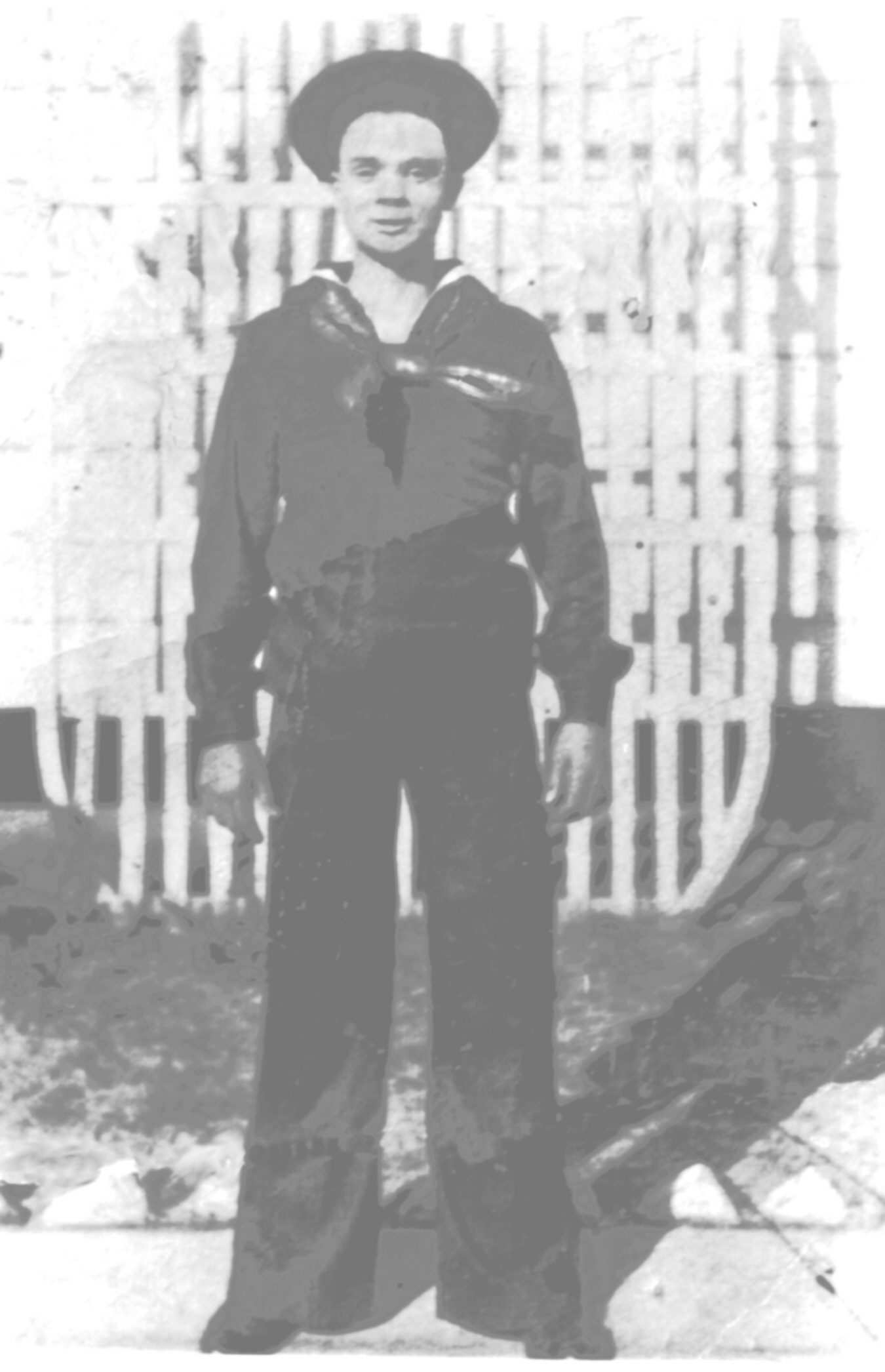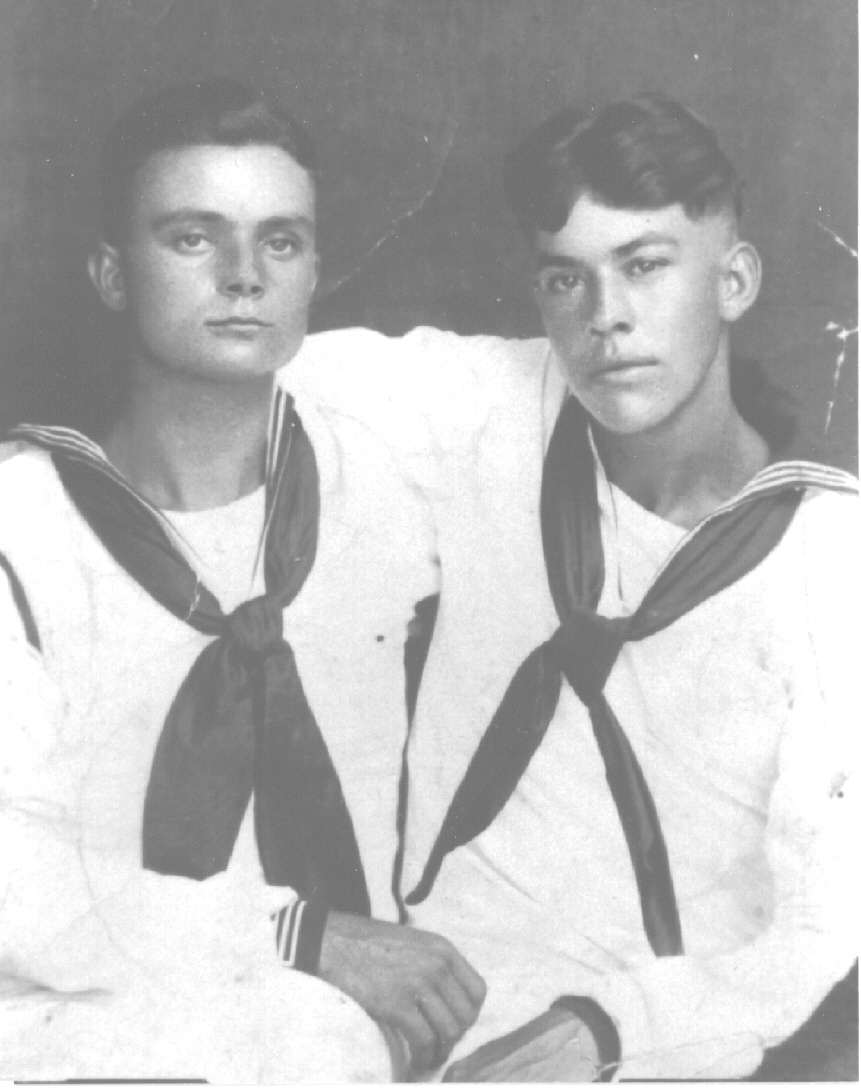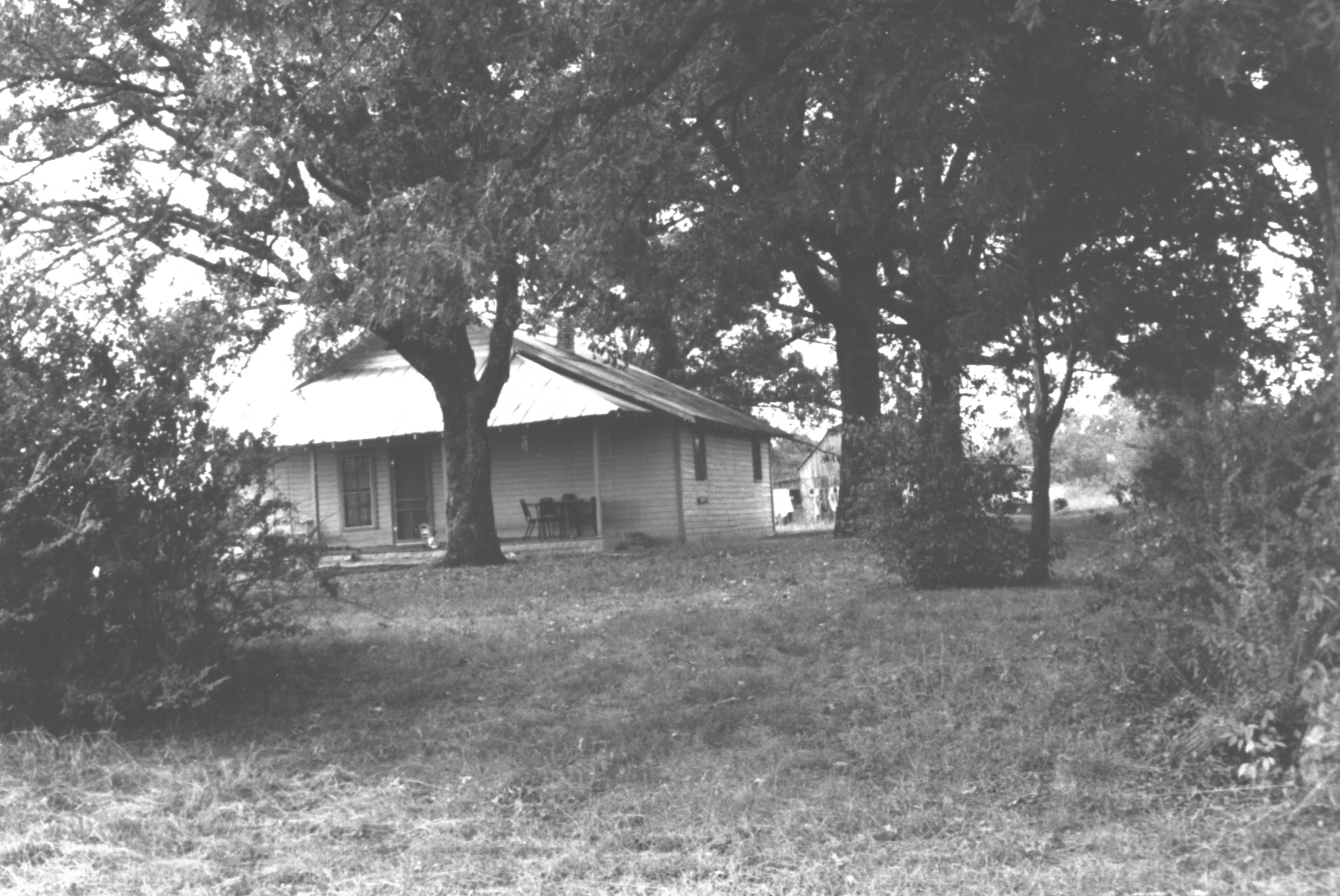
“H.N., Thaniel, Nate, Daddy”
The Story of my Life
Louise Virginia (Weir) Frasier
| Home | Introduction | Preface | Chapters | Do You Remember? | Stuff | Contact |
Chapter XII
|
E |
ven before May 28, 1932 when I finally got a high school diploma saying that I had completed twelve years of school as required in the state of Tennessee, I had been hearing about a new boy in the area. Flintville was a real village then: it’s smaller now. But when a new boy or girl came into the area, there was great excitement. If it was a boy all the girls were anxious to meet him and the boys were eager to look over the competition. And, of-course, if it was a girl, the girls wanted to see the competition at once and the boys were all anxious to see what she looked like and try to get a date.
At least six weeks before school was out, I’d been hearing about the new boy: cute, older, been in the Navy and around the world. He was living with his grandpa and might stay, but might go to Texas. One of my friends had an older sister that he’d been dating, and all the girls wanted a date with him. The boys even liked him, too.
But I was busy. I was going to take nurse’s training in a hospital in Gadsden, Alabama. A friend of mine, Mahalia Malone, was going with me. And I had two boy friends: I was engaged to one, but we were not going to get married for ten years (great romance!).
The other one had a motorcycle and you’re not going to hang around Sunday School or singings if you can go for a ride on a motorcycle. He had a sidecar and when he came to get me he’d bring it and I’d leave the house riding in it. Of-course I had on a dress. We Weir girls wore overalls around home, but you never caught us out in public in any kind of pants. Anyway, as soon as we were away (where certain tattle tales couldn’t see), we’d park the side car and I’d get behind him on the motorcycle.
The new boy’s name was Hoyt Nathaniel Frasier. He wanted everyone to call him Nate. His family called him Thaniel and later he was known, mostly, as Hoyt. But the first date that I had with him he asked me not to call him any of those: some day we’d think of a proper name to call him. So from now on when I write ‘Daddy’ you know exactly who I’m talking about.
By the way, I always hated the name Louise. I’ve never felt like a Louise. Papa called me Lutsy, Ruth called me Nancy, and Daddy called me Lula until I became Mama. Bertie, Tommy and Jimmy still call me Lula Belle.
Daddy had gotten discharged from a regular hitch in the Navy: in for three years. He was discharged in September 1931. He stayed around his home in Alabama for a few months, but Grandpa Frasier told him he was too big for his breeches, so he decided that there had to be a place where the grass would be greener, and the soil not so washed away that it wouldn’t even grow weeds. So he decided to go to Texas.
The term ‘hitch-hike’ had not been coined then. All roads were still unpaved and very few people went more than ten miles from home, even if they had cars. Cars were so unreliable that in rural areas they had been sawed off and two-wheeled carts made out of them. So riding the rails was the way of travel if you didn’t have any money: and who had twenty dollars to ride the train from New York to California? We’re talking about the late twenties and thirties now.
‘Hoboing’ was a way of life and ‘riding the rails’ the way of travel. You waited by a track where you knew a train would be stopping and you watched for the bull-guard. And when the train started rolling you jumped into an empty car: you knew that it was empty because the door would be open. Sometimes, if the car already had some tough guys in it, you’d get thrown out while the train was moving.
All Daddy’s life, he’d listened for the train whistle. Grandpa Frasier said that after Daddy got to be ten years old, if they were cutting wood, picking cotton, or whatever, you’d see him listening to the train whistle. And grandpa just knew that the next morning when he got up, Daddy’s coat and cap would be missing. They lived about seven miles from the nearest train station.
So now it’s 1932 and Daddy is riding the rails to Texas. He decided he would go through Flintville in Tennessee to see his Grandpa Veal and his Step-Grandma Bunch. Grandpa talked him into staying to help him farm. Grandpa Veal would give Daddy $1.00 a week and the cotton that five acres made. That would be about five bales of cotton. Cotton was still selling at five and a half cents a pound, so five bales would have been about $125.00 for the years work.
Daddy agreed to stay and he made the five bales of cotton. When Roosevelt was elected president, the price of cotton dropped to two and a half or two and a quarter cents a pound. That was fifteen dollars a bale, or seventy-five dollars for the year’s work.
Some people didn’t sell the cotton as it was picked: they held it back because everyone expected the price to go back up after Roosevelt took office. Daddy’s grandpa told him to hold his cotton back until after the election and that’s what he did. Papa was afraid to hold any back since he and Uncle Willie Wells had lost so much money when they were cotton brokers in Alabama.
Well, I’m not going to get side-tracked again to tell what a singing school is, but there I was at singing school and a nice looking young man winked at me and I winked right back! I knew who he was but I had not met him. I saw him all week and did a little flirting. The next Sunday after Sunday School, Daisy Shubert and I were hurrying along to meet some boys to go on a picnic. In Flintville, across the street from where Ola lives now, a boy and girl were standing. I knew his name by then, but I guess he didn’t know mine for when I started by, he caught my arm and said, “Hey, you’re pretty. What’s your name?”
Daisy said, “Hers is Pudding and mine is Tane.” He said, “Where are you going?” Daisy said, “To have some fun.” He said, “Wait a second and I’ll go with you.”
But what would we do with an extra boy? So we both said, “No way! We’ll see you later."
 |
Hoyt
Nathaniel Frasier “H.N., Thaniel, Nate, Daddy”
|
The next day at singing
school we talked some. Then when we started home—a road full of us walking
together—as we passed the store I remembered that I had to pick up something and
ran back to the store. There were about a dozen boys on the porch of the
store. When I came out again one of them—the one who was my true love at the
time—said, “Nate wants to walk home with you.”
I said to Nate, “Well come on, I don’t have all day.”
He walked me home and when we went into the house he saw my high school diploma and asked how old I was? Was I planning on getting married? Did I plan to have any kids?
I said, “Yes, about four.” He asked, “Don’t you think a dozen would be a nice number to have?” I said, “Yeah, if you’re crazy!”
He asked if I was dating anyone and I told him yes. Then he asked me not to date anyone else but him for a month, then if I decided that I didn’t like him, he’d find someone else. The next Sunday he came with his guitar and walked back with me to Flintville to all-day church. Mama said that we were beautiful. I guess because we were both so happy!
Everything is so different in 1991 to what it was in 1932. It was certainly not the atomic age. And neither was it a time of television or radio. Even the telephone communication system was so poor that modern kids wouldn’t believe me if I tried to tell them about it. Flight was possible, but you sure didn’t call on the phone and make a reservation to fly to San Francisco from New York in four hours. Airplanes were used in World War I, but they were planes with four wings that would fly at very low altitudes. And still, in 1932, if a plane was heard, everybody ran out to see it. Barn-storming stunt pilots were still traveling around putting on shows. In 1931 there was such a show at Fayetteville, Tennessee. We lived at Flintville, 18 miles away and we went to see the show. The pilot got too low, lost control, and killed 15 people. The propeller cut the heads off some and some were killed from the impact of the plane.
So in 1932 there wasn’t much transportation. Walk, walk, and more walking! Grandpa Veal lived four miles from Flintville and we lived one mile on the other side. When Daddy and I were dating, he would walk to Flintville, then he wouldn’t let me walk with everybody else, he had to walk the extra mile to walk back with the rest of us. Then when church or whatever was over, I’d try to get him to go directly home, but NO! he walked with me again, then back alone.
There were generally eighteen to twenty people walking, so there was no hanky-panky going on. Daddy always came over about twelve o’clock on Saturdays and would go home about ten o’clock that night. Back on Sunday morning to spend the day doing whatever we did. He also came Tuesday and Thursday nights.
Daddy sure did a lot of walking between July 4th and November 12th.
He went back to Alabama for two weeks in August to tell his family that we were
going to get married. He had already told my Mama and I still hadn’t told him
that I would marry him!
 |
Hoyt Nathaniel Frasier and friend |
But, I finally said yes and we were married November 12, 1932 at Fayetteville, Tennessee in Lincoln County. But a Marriage license cost $2.00 in the state of Tennessee and Daddy didn’t have the two dollars.
Banking was different then from what it is now. There were banks, of-course, but you didn’t have checking accounts and write checks. If you had any money, you put it in the bank: sort of like a savings account. And when you needed your money, you went into the bank and withdrew some. The bank made their money by lending money. In 1932, the interest rate was one half a percent. You made mostly ninety-day loans, or yearly loans.
Well, we were going to get married and Daddy needed the money for the license, so he went into the bank at Kelso, Tennessee and told the banker, “I am Richard Veal’s grandson and I want to borrow two dollars. I’m going to get married and need the money to buy a license. I have five bales of cotton and I’ll pay you back as soon as I sell it.”
The banker said, “I’ll tell you what, why don’t I let you have five.”
So we had five dollars when we went to get married that cold, rainy, miserable day. Daddy had gone the day before to get the license, but they told him that since I was under twenty-one my parents would have to sign for me. That night Daddy asked Papa if he would go to town the next day.
Papa said, “Yes, I’ve got to go pay my dog tax anyway.” There were no stock laws
in Tennessee. That is, you didn’t have to keep your livestock in a pasture,
they could roam wherever they wanted to. Therefore, if you had a dog, you had
to pay a dog tax so they could keep track of whose dogs were bothering the cows.
 |
“Fairies danced
on the ceiling” Grandpa Veal’s House |
You had to pay poll tax, too, so you could register to vote. The poll tax was $5.00 every time you registered. As long as I can remember, you had to be able to write your name and pay the poll tax before you could register to vote. (So voter registration records would be useless for someone doing a genealogy.)
So we got the license for $2.00 and gave fifty cents to Pea Vine Lee, who took us to Fayetteville. The Baptist preacher was going to marry us, but Daddy said, “Let’s go get the judge to marry us”: and then, he forgot to give the judge anything for marrying us. The judge’s clerk and Papa were witnesses. On the way home we stopped and got hot chocolate. Four cups for twenty cents.
I wore Mary Will’s skirt and Elizabeth’s sweater. Dressy, huh! Mama had ordered a dress for me from Sears for $2.98 but it hadn’t come. I wore a camel hair coat. Mary Will had a coat just like mine. They cost 8.00 each.
We stayed at my parent’s house the first three nights and then spent a couple of nights with Nate’s grandpa Veal.
I was pretty scared for we were in the middle of the depression and poverty stared us in the face. But the first night at Grandpa Veal’s house there was a full moon, which we could see through the lace curtains at the windows. The wind was blowing very gently. It was November and the leaves of the water oak trees outside the window were dead, but they had not fallen off yet. I was sound asleep but Daddy woke me up when he whispered, “Wake up and watch the fairies dancing on the ceiling!”
His “fairies” were the shadows of the leaves dancing on the ceiling! In that
moment I lost all fears and knew that if I had to walk in snow barefoot, swim
rivers, or starve that it would be a nice journey. I did all those things and
more and every moment was one of joy!
 |
Louise and Hoyt
Frasier Mama and Daddy |